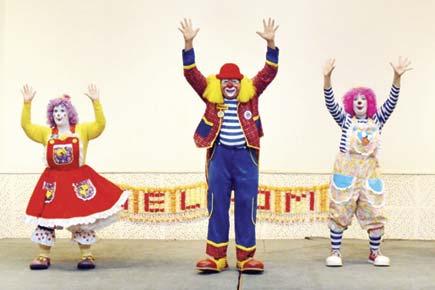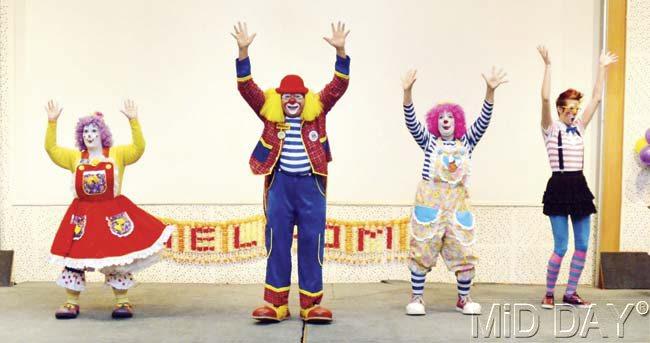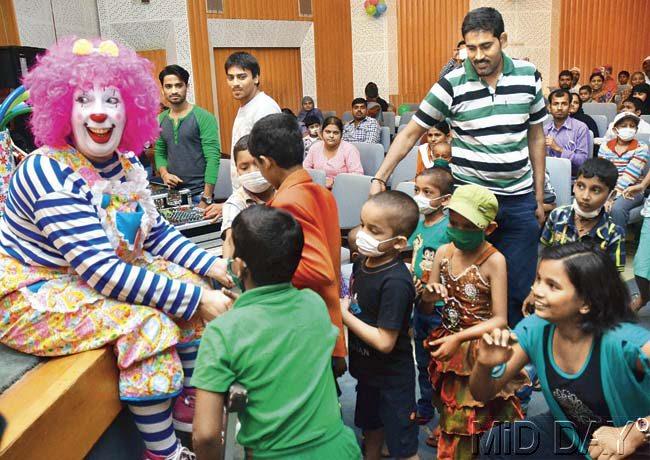International clowns Flubber, Skiddles, Toto, Lolo, Puff and Dee Dee believe life is all ha ha, hee hee

Those that deal in smiles, have come several miles. Professional clowns are in the city to perform at various venues, as part of the International Clowning Festival. Yesterday, these clowns (two men and four women) brought laughter in the lives of children afflicted with cancer at Parel’s Tata Hospital.
ADVERTISEMENT

The clowns regaled children at the Tata Hospital in Parel yesterday. Pics/Datta Kumbhar
Tomorrow, the professionals are going to be at the Phoenix High Street (Lower Parel) and on Sunday, they are to be at Phoenix Market City in Kurla. On Monday, they have a clown workshop for clowning aspirants to be held in Bandra.

Clowns travel miles to see these smiles
Besides one Indian clown, the other clowns are from USA and Canada, bringing the international dimension to this festival. They have been in India since October 3 visiting Mangalore, Delhi, Chennai, Hyderabad and Bangalore and are set to sign off with their Mumbai stint.
Flubber
Mumbai’s Martin D’Souza, who is organiser in chief of the International Clown Festival, and who is a professional clown himself, with a clown name of ‘Flubber’, says, “We have six clowns, including me.
The five other clown names are, Dee Dee, Toto, Skiddles, Lolo and Puff. This is the third edition of the International Clown Festival, which is now a coveted international property.
International clowns love Indian audiences. They are amazed at the genuine warmth and appreciation they receive. We have children wanting to shake our hands or hug us, post shows and take our pictures. Adults thank us for providing such good, clean fun.”
Says ‘Flubber’ or Martin D'Souza, “There is a lot of hard work that goes on behind the scenes for clowning. Practicing juggling, learning magic, we have a repertoire of skills we have to continually refine.”
Flubber, who says he travels overseas at least twice a year for clowning workshops, says that though clowning is catching on in India, “Here, clowns need to work on looking good.
Many are not appealing and are actually scary to children. They have to learn exactly how to put on make-up, that will stay well for the whole day. They need to wear bright, coloured costumes instead of being shoddily dressed.”
Superstars
Recently, the popularity of stand up comedies has spiked in India, with entertainment companies bringing stand up comics from overseas and many Indians seeking to make a career out of that avenue.
Flubber stated that besides the obvious differences between stand-up comedy and clowning, “A clown never makes fun of the audience. They never put down people. For clowns, the people are the superstars, as opposed to stand up comic shows where nobody wants to sit in the front row as they know they will be picked upon.”
Contemporary clowning means not just work at the circus but at birthday parties, schools and hospitals. “I couch social messages in my clowning acts, like no honking or no littering,” says Flubber, who adds that, clowning cuts across all boundaries. “In countries in the Middle East, we have had women in burkhas learning juggling at camps,” he says.
When one sees children and adults too, reacting to clowning, one realises that mirth is a universal lingo. The sound of laughter echoing across countries and Continents is much better than gunshots.
 Subscribe today by clicking the link and stay updated with the latest news!" Click here!
Subscribe today by clicking the link and stay updated with the latest news!" Click here!






